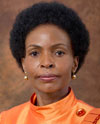By Maite Nkoana-Mashabane
 Sunday marks International Women’s Day. Around the world citizens will be reflecting on the progress made in achieving women’s empowerment and gender equality, and paying tribute to women who have played a remarkable role in the history of their countries and communities.
Sunday marks International Women’s Day. Around the world citizens will be reflecting on the progress made in achieving women’s empowerment and gender equality, and paying tribute to women who have played a remarkable role in the history of their countries and communities.
In South Africa and on the African continent, we have a proud history of robust women’s movements and civil society activism that inspired global solidarity in the fight against colonialism and apartheid. These movements are still seen as the epitome of grassroots activism.
The theme for this year’s International Women’s Day, “Empowering Women – Empowering Humanity: Picture it!”, envisions a world where each woman and girl can freely exercise her rights, from participating in politics to obtaining an education, having an income and living in societies free from violence and discrimination.
This year also marks 20 years since the adoption of the Beijing Declaration and Platform for Action, a historic roadmap signed by 189 governments that set the agenda for realising women’s rights. While there have been many achievements since then, serious gaps remain.
It is therefore important that we do not allow the rights of women and girls to regress.
We need to mobilise ourselves to do our part in realising women’s rights and gender equality in our respective countries and regions.
This year’s International Women’s Day is of significant importance to the African continent, as it coincides with the declaration by the AU of 2015 as the “Year of Women’s Empowerment and Development.”
Our regional agenda enriches and draws upon national and global frameworks, including the UN Convention on the Elimination of All Forms of Discrimination Against Women (Cedaw) and the Beijing Platform for Action.
In this regard, our continental programmes on gender equality and women’s empowerment will be given the highest priority during 2015.
The success of our programmes will be measured by ensuring that women are represented in all peace processes; by increasing women representation in public life; by achieving economic empowerment and the financial inclusion of women; and by modernising agriculture, and addressing women’s access to land, technology, markets, infrastructure and capital.
These programmes have been endorsed by Africa’s leaders so that, by 2063, Africa’s women are fully empowered in all spheres, with equal social, political and economic rights, including the right to own and inherit property, sign a contract, register and manage a business.
By 2063, women in rural areas must have access to productive assets, including land, credit, inputs and financial services.
All forms of violence and discrimination against women and girls should be eliminated.
Africa by 2063 must have full gender parity, with women occupying at least 50 percent of elected public offices at all levels and half of managerial positions in the public and private sector.
South Africa and the continent’s progress made towards women’s empowerment and gender equality are demonstrated by sound legislative frameworks; institutional mechanisms and arrangements that have been put in place to promote women’s rights, empowerment and gender equality and the achievements in the representation of women in political and decision-making positions both in the public and private sectors.
However, we are still faced with major challenges and crises on the continent that impact disproportionately on women and girls.
Natural disasters and other humanitarian crises, conflict, violence, poverty, patriarchy and structural barriers to gender equality, inadequate access to health, and harmful traditional practices are some of the obstacles that not only threaten Africa’s progress but also that of the international community.
If we are to reach our continent’s targets for achieving women’s empowerment and gender equality then it is clear we cannot do business as usual.
Women’s empowerment and gender equality will not be achieved if we do not meet our goals of development, peace, security and human rights. Mainstreaming a gender perspective into all policies and programmes and allocating adequate resources should be part of national, regional and global efforts to champion the rights of women and girls.
Africa should once again lead in driving movements for change and solidarity – this time for women’s empowerment and gender equality.
We cannot afford to allow another 20 years to pass, leaving the aspirations of the millions of our women and girls as contained in the Beijing Platform and Agenda 2063 to go unrealised.
Maite Nkoana-Mashabane is Minister of International Relations and Cooperation.





